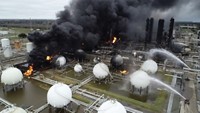Advertisement
Grab your lab coat. Let's get started
Welcome!
Welcome!
Create an account below to get 6 C&EN articles per month, receive newsletters and more - all free.
It seems this is your first time logging in online. Please enter the following information to continue.
As an ACS member you automatically get access to this site. All we need is few more details to create your reading experience.
Not you? Sign in with a different account.
Not you? Sign in with a different account.
ERROR 1
ERROR 1
ERROR 2
ERROR 2
ERROR 2
ERROR 2
ERROR 2
Password and Confirm password must match.
If you have an ACS member number, please enter it here so we can link this account to your membership. (optional)
ERROR 2
ACS values your privacy. By submitting your information, you are gaining access to C&EN and subscribing to our weekly newsletter. We use the information you provide to make your reading experience better, and we will never sell your data to third party members.
Safety
Deadly Chemical Blasts In Taiwan
Process safety: Operator allegedly let propylene leak for two hours prior to accident
by Jean-François Tremblay
August 11, 2014
| A version of this story appeared in
Volume 92, Issue 32

A series of explosions caused by leaks in an underground propylene pipeline in Kaohsiung, Taiwan’s second-largest city, killed 30 people and injured 300 more on the evening of July 31, according to the state-owned Central News Agency. The pipe was bringing raw material to LCY, a chemical company that operates several plants in the industrial city.
Five firefighters were among the dead, the news agency reported. The blasts occurred when emergency responders were already at the scene investigating reports of gas smells. The pipe ran under the streets of a busy commercial and residential neighborhood.
Amid claims that the tragedy could have been avoided, four senior Taiwan government officials, including the economic minister, have tendered their resignations.
Investigators have determined that the propylene pipeline responsible for the blast belongs to LCY. For two hours before the blast, 10 metric tons of propylene leaked from the pipe, according to Kaohsiung’s Environmental Protection Bureau.
Accusations and denials are flying in the wake of the accident. Kaohsiung officials maintain that LCY could have turned off its propylene supply as soon as it noticed a drop in pressure. LCY issued an apology for its role in the accident but also alleges that maintenance of the pipe was the responsibility of its builder, China Petroleum Corp., which denies responsibility.
The government of Kaohsiung has asked a Taiwanese court to order the provisional seizure of LCY assets to ensure payment to victims of the tragedy. LCY shares, listed on the Taiwan Stock Exchange, have plummeted since the accident.
Tracing its roots back to the 1940s, LCY is Taiwan’s largest producer of polypropylene. It is run by Bowei Lee, a chemical engineer who graduated from MIT and who holds an MBA from Stanford University. The company was in the news last month when its deal to merge its styrenic block copolymer business with that of the U.S. company Kraton Performance Polymers was in jeopardy. Kraton now says it is canceling the deal and that, owing to the accident, it doesn’t need to pay a $25 million breakup fee.



Join the conversation
Contact the reporter
Submit a Letter to the Editor for publication
Engage with us on Twitter